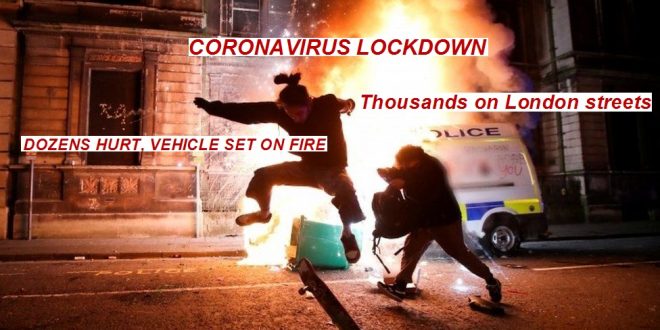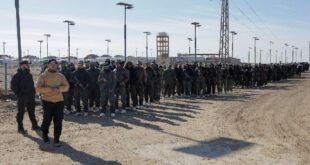22-03-2021
By SJA Jafri + Agencies + Bureau Report
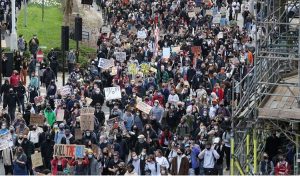 BRISTOL/ LONDON: Two police officers were seriously injured and at least two police vehicles were set on fire in the city of Bristol in southwest England during violent scenes after a peaceful protest, police said.
BRISTOL/ LONDON: Two police officers were seriously injured and at least two police vehicles were set on fire in the city of Bristol in southwest England during violent scenes after a peaceful protest, police said.
Thousands of demonstrators had converged on the city centre, ignoring COVID-19 restrictions, to protest against a government bill going through parliament that would give police new powers to restrict street protests.
The local force, Avon and Somerset Police, said the demonstration began peacefully but was later turned into a violent disorder by a small minority.
Home Secretary Priti Patel, the interior minister, said on Twitter that the scenes in Bristol were unacceptable.
“Thuggery and disorder by a minority will never be tolerated,” she said. “Our 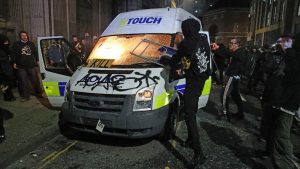 police officers put themselves in harm’s way to protect us all. My thoughts this evening are with those police officers injured.”
police officers put themselves in harm’s way to protect us all. My thoughts this evening are with those police officers injured.”
Two officers were taken to hospital, one with a broken arm and another with broken ribs, while others were subjected to violence and verbal abuse. The outside of a police station in the city centre was vandalized.
Avon and Somerset Police said it had requested help from neighboring forces to bring the situation under control.
“All those involved in this criminal behavior will be identified and brought to justice. There will be significant consequences for behavior such as this,” Avon and Somerset’s chief superintendent, Will White, said in a statement.
A photographer at the scene saw some demonstrators launch fireworks 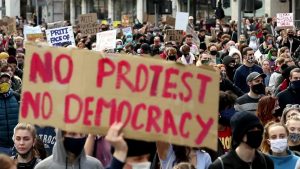 towards police officers, try to knock over a police van, scale the outside wall of a police station and spray graffiti on it.
towards police officers, try to knock over a police van, scale the outside wall of a police station and spray graffiti on it.
He also saw police, some in full riot gear, using batons and shields to try to repel protesters.
Some demonstrators carried placards with slogans such as “Kill the Bill”, “The Day Democracy Became Dictatorship” and “We Can’t Be Silenced That Easy”.
The government’s Police, Crime, Sentencing and Courts bill would give police new powers to impose time and noise limits on street protests.
That has angered activists, particularly since a heavy-handed police response to a London vigil for murder victim Sarah Everard on March 13 caused widespread outrage and criticism of the police.
A serving police officer has been charged with Everard’s kidnap and murder, and the case has unleashed an outpouring of grief and rage over the issue of 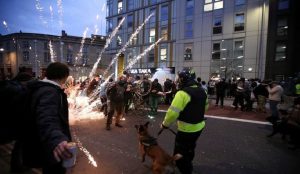 violence against women and girls.
violence against women and girls.
The government bill pre-dated the Everard case and covers a wide range of policy areas as well as the policing of protests. However, the two became connected in many people’s minds because, by coincidence, the bill was up for debate in parliament two days after the London vigil.
Meanwhile, thousands of people turned up on the streets of London on Saturday to protest against the ongoing coronavirus restrictions, with police arresting 36 people.
London Police, under increased scrutiny for breaking up recent protests, took action against protesters for breaching the months-old virus regulations that outlaw leaving home except for a limited number of reasons.
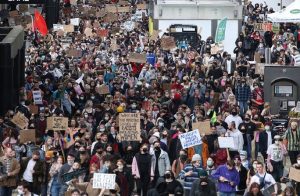 Several thousand people were estimated to have gathered for the demonstrations, which began Saturday lunchtime at Hyde Park.
Several thousand people were estimated to have gathered for the demonstrations, which began Saturday lunchtime at Hyde Park.
After the crowd marched through central London, a group of around 100 returned to the park where police said they threw missiles at officers.
“Several were injured as a result of targeted assaults,” Deputy Assistant Commissioner Laurence Taylor, who led the policing operation, said in a statement.
“It is totally unacceptable and saddening that officers enforcing regulations that are there to protect us all were the victims of violent attacks.”
England’s Covid-19 lockdown measures have been in place since early 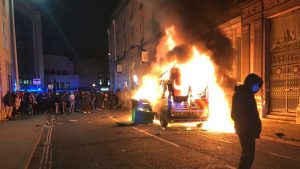 January, when Britain saw a surge in infection rates, hospitalizations and deaths.
January, when Britain saw a surge in infection rates, hospitalizations and deaths.
The situation has improved markedly since then, and Prime Minister Boris Johnson last month outlined a gradual easing of the restrictions, with the stringent stay-at-home order set to end later this month.
Anti-lockdown demonstrations by hundreds or even thousands have occurred regularly during the pandemic, often resulting in a small number of arrests.
However, the police response to Saturday’s protests was under particular scrutiny in light of the outrage over the Met’s handling of a vigil last weekend for a woman who was allegedly kidnapped and murdered by a member of the same force.
On that occasion, police scuffled with the predominantly female crowd of 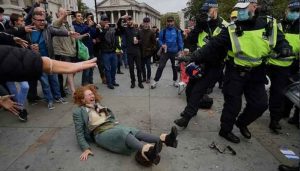 several hundred and physically restrained demonstrators, arresting four people.
several hundred and physically restrained demonstrators, arresting four people.
Met Police Commissioner Cressida Dick, who faced calls to resign in the aftermath, agreed to both internal and independent reviews into how officers responded but in a development likely to increase pressure on the force, media report revealed Sunday that Met employees faced hundreds of sexual misconduct allegations between 2012 and 2018.
According to documents the paper accessed under freedom of information laws, 119 of the 594 complaints were upheld after investigation.
The accusations probed included that an officer had had sex with a rape victim and another had assaulted a domestic abuse survivor, it said.
The rape victim complained the officer “took advantage of her vulnerability 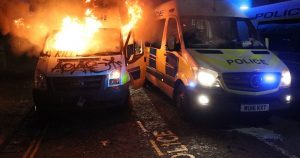 and had sex with her on two occasions”, media reported, with the officer subsequently dismissed.
and had sex with her on two occasions”, media reported, with the officer subsequently dismissed.
The Met told the paper the claims involve “a small percentage of staff” but that it takes “allegations of this nature extremely seriously”.
“If standards are proven to have fallen below what is expected, we take appropriate action to ensure both accountability and that lessons are learnt from each case,” it added.
In the meantime, recent events have also sparked renewed debate about legal curbs on protests during the pandemic.
More than 60 lawmakers signed a letter Saturday, co-ordinate by rights groups Liberty and Big Brother Watch, warning that criminalizing protest “is not acceptable and is arguably not lawful”.
 Pressmediaofindia
Pressmediaofindia
